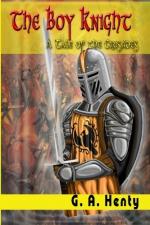Cuthbert passed much of the day, when not required upon the walls, chatting with the Lady Margaret, who, attended by her maidens, sat working in her bower. She had learned to read from the good nuns of the convent—an accomplishment which was by no means general, even among the daughters of nobles; but books were rare, and Evesham boasted but few manuscripts. Here Margaret learned in full all the details of Cuthbert’s adventures since leaving England, and the fondness with which as a child she had regarded the lad grew gradually into the affection of a woman.
The courage of the garrison was high, for although they believed that sooner or later the castle might be carried by the besiegers, they had already been told by Cnut that there was a means of egress unknown to the besiegers, and that when the time came they would be able to escape unharmed. This, while it in no way detracted from their determination to defend the castle to the last, yet rendered their task a far lighter and more agreeable one than it would have been had they seen the gallows standing before them as the end of the siege.
As the testudo, as it was called in those days, advanced toward the castle, the machines upon the walls—catapults, mangonels and arbalasts—poured forth showers of stones and darts upon it, breaking up the array of shields and killing many; and as these openings were made, the archers, seizing their time, poured in volleys of arrows. The mercenaries, however, accustomed to war, advanced steadily, and made good their footing beneath the castle wall, and proceeded to rear their ladders. Here, although free from the action of the machines, they were exposed to the hand missiles, which were scarcely less destructive. In good order, and with firmness, however, they reared the ladders, and mounted to the assault, covering themselves as well as they could with their shields. In vain, however, did they mount. The defenders poured down showers of boiling pitch and oil, which penetrated the crevices of their armor and caused intolerable torment. Great stones were toppled over from the battlements upon them; and sometimes the ladders, seized by the poles with hooks, were cast backward, with all upon them, on the throng below. For half an hour, encouraged by the shouts of Sir Rudolph and their leaders, the soldiers strove gallantly; but were at last compelled to draw off, having lost nigh one hundred men, without one gaining a footing upon the walls.
That evening another council of war was held without. Already some large machines for which Sir Rudolph had sent had arrived. In anticipation of the possibility of failure, two castles upon wheels had been prepared, and between these a huge beam with an iron head was hung. This was upon the following day pushed forward on the newly-formed ground across the moat. Upon the upper part of each tower were armed men who worked machines casting sheaves of arrows and other missiles. Below were those who worked the ram. To each side of the beam were attached numerous cords, and with these it was swung backward and forward, giving heavy blows each stroke upon the wall. The machines for casting stones, which had arrived, were also brought in play, and day and night these thundered against the walls; while the ram repeated its ceaseless blows upon the same spot, until the stone crumbled before it.




